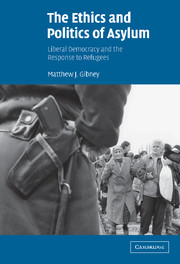Book contents
- Frontmatter
- Contents
- Acknowledgements
- Introduction
- 1 Partiality: community, citizenship and the defence of closure
- 2 Impartiality: freedom, equality and open borders
- 3 The Federal Republic of Germany: the rise and fall of a right to asylum
- 4 The United Kingdom: the value of asylum
- 5 The United States: the making and breaking of a refugee consensus
- 6 Australia: restricting asylum, resettling refugees
- 7 From ideal to non-ideal theory: reckoning with the state, politics and consequences
- 8 Liberal democratic states and ethically defensible asylum practices
- List of references
- Index
6 - Australia: restricting asylum, resettling refugees
Published online by Cambridge University Press: 22 September 2009
- Frontmatter
- Contents
- Acknowledgements
- Introduction
- 1 Partiality: community, citizenship and the defence of closure
- 2 Impartiality: freedom, equality and open borders
- 3 The Federal Republic of Germany: the rise and fall of a right to asylum
- 4 The United Kingdom: the value of asylum
- 5 The United States: the making and breaking of a refugee consensus
- 6 Australia: restricting asylum, resettling refugees
- 7 From ideal to non-ideal theory: reckoning with the state, politics and consequences
- 8 Liberal democratic states and ethically defensible asylum practices
- List of references
- Index
Summary
It is our duty to present to the world the spectacle of a rich country with a great people, with an adequate population – with a population which may say justly to the rest of the world: We are here; we propose to maintain our integrity as a nation; and our warrant for that is that we are using the resources which God has given into our hands. The case for migration on a great scale is indeed an irresistible one.
Robert Menzies, Prime Minister of Australia 1950Australia's interests [fall] … in three broad categories: geo-political or strategic interests; economic and trade interests; and the national interest in being, and being seen to be, a good international citizen.
Gareth Evans, Australian Minister for Foreign Affairs 1991If the view becomes entrenched around the world that it's easy to get into this country, we will have an enormous problem … We will have an unbelievable problem trying to control our borders.
John Howard, Prime Minister of Australia 2001In 1991 Australia's Minister for Foreign Affairs, Gareth Evans, stated that fulfilling the duties of a ‘good international citizen’ was one of the major objectives of Australian foreign policy (Evans and Grant 1991: 34). International citizenship, he claimed, involved demonstrating a readiness to tackle some of the vast range of global challenges currently confronting the international community. One challenge singled out was solving ‘the world-wide problem of refugees’ (Evans and Grant 1991: 35).
- Type
- Chapter
- Information
- The Ethics and Politics of AsylumLiberal Democracy and the Response to Refugees, pp. 166 - 193Publisher: Cambridge University PressPrint publication year: 2004



